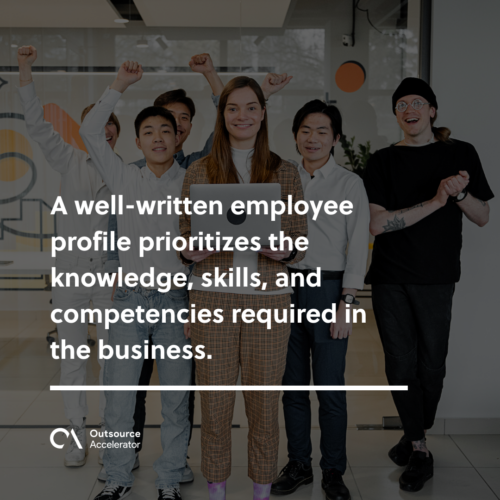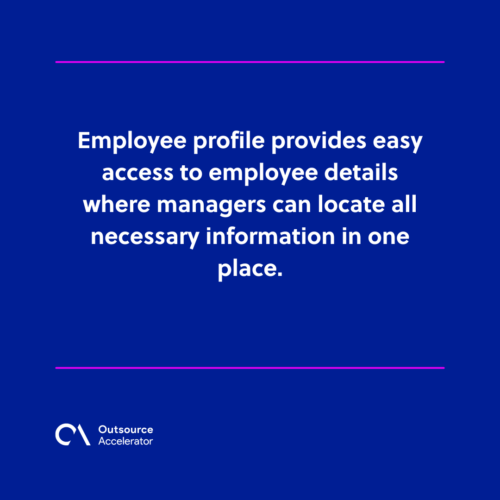What it means to have a good employee profile

In today’s globalized world, businesses face fierce competition in searching for the best talents for the company.
This can be very difficult because people value different factors when applying for a job.
For example, an applicant may have the particular skill set or previous experience the firm requires, but the employer might look for other qualities.
The hiring process, in general, includes a systematic approach to screening suitable applicants for a company.
One of the hiring methods businesses use is profiling which features information about employee activities directly from the labor statistics.
Another is having a well-defined set of questions to readily guide recruiters in analyzing candidates’ credentials and qualities.
However, creating an employee profile is critical in recruitment and ensures that an organization makes the best possible hiring.
What is an employee profile?
An employee profile is an online presence of employees that helps reflect their professional identity at the organization.
Writing employee profiles are crucial for the promotion or administration of any organization. And these are also efficient methods to present the applicant’s identity in the workplace.
A well-written employee profile prioritizes the knowledge, skills, and competencies required in the business.
This gives candidates a chance to introduce themselves to the organization, which will assist in making their application more favorable than other job seekers.

However, the amount of data recorded in an employee profile may vary from one sector to another. It can be an employee profile software or a web page where the employee can describe himself and post his credentials.
Employee profile sets out the expectations for every member of the team. It also identifies the job title and specific responsibilities assigned to each worker.
Generally, an employee profile includes the following:
- Employment history
- Educational background
- References
- Job-specific information
- Duties and responsibilities
Employers refer to the employee profile for appraisal, probationary period, and success at the organization. It ensures that a company makes informed decisions regarding an employee’s performance.
Furthermore, a good employee profile is crucial in increasing employee engagement and corporate benefits packages.
Eight significant benefits of employee profile
Everyone must have a work profile highlighting their skills, education, and relevant experience.
Having the right employee profile gives benefits like greater productivity, lower turnover, and lower conflict rates in the company.
Here are other significant benefits of having an excellent employee profile:
1. Bring together remote employees
When people work remotely, it can be challenging to understand each identity accurately.
Employees who don’t see each other in person cannot convey individual personalities by just emailing. So, profiles are necessary to provide accurate information about a person.
When members fill out their employee profiles, they let everyone around them know about their professional expertise and personality – making it easy to form connections.
2. Improve working relationships
Building good working relationships is extremely important to the overall health of an organization.
Essentially, having a clear and informative employee profile can help put new hires at ease in their new job.
It helps to create better working relationships by allowing employees to share their knowledge and expertise.
Because of employee profiles, people in an organization can also define and manage their work styles and coordinate their efforts with other workers.
3. Smarter collaboration
An employee profile provides a more innovative collaboration. This is effective in improving the overall team productivity and performance.
For example, human resource managers use employee profiles to understand team members’ strengths and weaknesses. Then, they put the employees at the center of productive communication.
Additionally, managers can also put members in a group according to their matched capabilities.
4. Easy access to employee details
Another essential benefit of creating an employee profile is that it can save an organization a lot of time in information management.
Employee profiles provide easy access to employee details where managers can locate all necessary information in one place.
It also gives detailed information about their roles and responsibilities, setting meaningful goals and timelines, and attendance tracking.

5. Paperless documentation
An employee profile has a document management system that enables paperless data documentation.
The paperless documentation allows employees to upload their documents in a secure portal, whether it is a vacation time request, timesheet, or employee ID badge.
Essentially, this employee profile feature allows employees to concentrate on their performance instead of wasting time filling out paperwork.
6. Keeps personal information safe
An employee profile database complies with data security regulations. This is especially helpful to remote employees. It also stores all personal data in one place, keeping them safe from identity theft.
7. Helps in talent scouting
Employee profiles help to store critical information about one’s professional skills and background.
It is an excellent tool for those in managerial positions and trying to find the perfect candidate to take on a specific role or responsibility.
8. Ensures interviews have a clear direction
The database of an employee profile is helpful in the pre-screening process. It helps disseminate comprehensive information about the candidate.
As a result, it provides an opportunity for companies to ensure that there is a presence of employee engagement in their firm and that people fit into the company culture and are happy at work.
Create an ideal employee profile for a better hiring process
Creating employee profiles can help you streamline the recruitment process. Ultimately, it’s about setting clear goals for the company.
It should reflect what your company needs regarding skills, experience, values, and attitudes. This helps organizations identify suitable candidates for the position.
With an ideal employee profile in hand, you can be sure that you’re taking the best approach to recruitment.







 Independent
Independent




